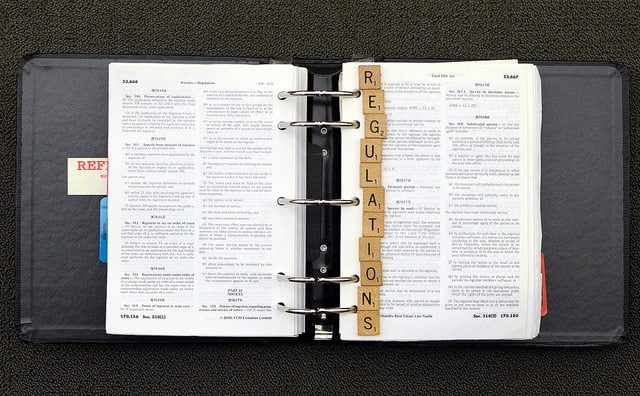Reason to trust

How Our News is Made
Strict editorial policy that focuses on accuracy, relevance, and impartiality
Ad discliamer
Morbi pretium leo et nisl aliquam mollis. Quisque arcu lorem, ultricies quis pellentesque nec, ullamcorper eu odio.
There are lots of debates happening in the Bitcoin community. While the most prominent one is on block size, another significant topic is regarding Bitcoin regulations. There are a set of companies and organizations stressing for regulations in the Bitcoin sector , which the opposite camp believes will violate the very principles the digital currency is built on.
These debates get hotter each time a new state in the United States decides to introduce digital currency legislations. For starters, Bitcoin was created as a peer to peer method of transaction, with the main intention of keeping banks, governments, and other third parties from interfering with the financial freedom of individuals. Even the timing of Bitcoin’s introduction coincides with the time when the US banking system was reeling under economic slowdown and barely managing to keep their heads above the water without government’s bailout packages.
The introduction of regulations that require Bitcoin companies to act like conventional banking sector by collecting user information, tracking transactions, blocking accounts and reporting to the government will negate almost all advantages the digital currency has over fiat currency. However, those who are calling for regulation of bitcoin and bitcoin-based services believe that the digital currency regulations will make it easier for them to conduct business, without having to worry about legal issues, even if it means the interest of general public takes a backseat. Those calling for the implementation of regulations are not the individuals of the community, but a handful of companies that stand to make lots of money in the long run.
At the same time, governments from various states of the United States have started to draft their own regulations for digital currency and digital currency based applications. The State of New York was the first one to do so and North Carolina, the latest one. On an international level, Japan recently conferred bitcoin with the status of a legal tender akin to Japanese Yen, US Dollar and British Pound.
READ MORE: Japanese Regulators Propose FSA to Treat Bitcoin as Conventional Currency
However, it is worth noting that the BitLicense introduced by New York state damaged its reputation among many bitcoin and blockchain based companies. A lot of them ended up leaving the state instead of applying for costly BitLicense. These developments in Bitcoin laws and regulations are being constantly monitored by a Washington DC-based cryptocurrency think-tank, Coin Center.
Upon analyzing the regulations from various states, it was found that the states may be abusing their authority to implement AML and KYC regulations, which otherwise comes under the purview of the federal government. In addition, the state-level implementation of Bitcoin regulations lacks uniformity across the country, making it hard for companies to operate under the same license across the country.
READ MORE: North Carolina Bitcoin Legislation Is Decent But Not Perfect
There is no immediate reprieve from Bitcoin regulations at the moment as we can expect more and more states and countries to introduce their own laws in the coming months. However, to what extent these laws attempt to restrict the activities of Bitcoin companies is something to watch out for.
Ref: Observer | Image: Regulations - Tom Magliery (Flickr)



























